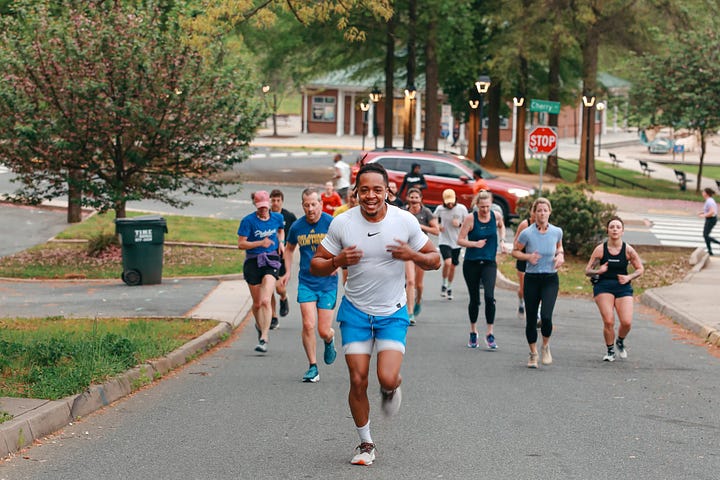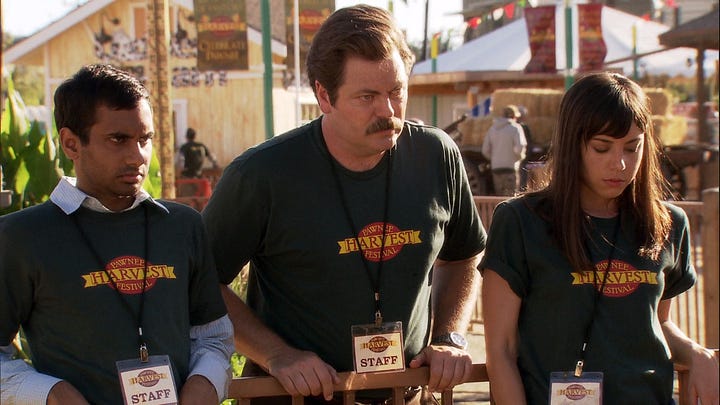Why every town should host an activities fair
Just as colleges host activities fairs to energize campus life, so too can town leaders host activities fairs to energize civic life
Quick Note: This is our second post on practical solutions for local government to strengthen the connectedness of their communities. We encourage you to read our first post — “Why every town should offer a welcome kit” — if you haven’t already had the chance.
How do you find out about groups or activities to get involved with in your town?
For most of us, it usually takes a bit of chance. Your friend may encourage you to join a group that she’s a member of. You may see a flyer that catches your eye in a coffee shop or library. You may hear about something that piques your interest on the news or social media. You may walk by a house of worship or club and decide to go inside.
These chance encounters are essential to the beautiful, organic spontaneity of civic life in our communities. But we cannot rely on chance alone to regenerate the civic life that has withered in so many places. Structure is also necessary. Cities and towns need a way to both activate community groups to recruit new members and encourage residents to become involved.
Fortunately, there’s a tried and true method to spur this type of community participation: the activities fair.
Colleges host activities fairs to great effect. Students, especially those new to campus, have the opportunity to learn about and cultivate relationships with all of the clubs that they can possibly join. Clubs have the opportunity to engage with and recruit a large base of prospective members — all concentrated in one place and all open to becoming involved. Despite their simplicity, activities fairs are a crucial structure — built into the school calendar — for maintaining and strengthening campus life.
The civic life of towns is not all that different from the campus life of colleges. Residents are like students, paying taxes instead of tuition to receive a set of services from local government. Town leaders are like administrators, responsible for delivering these services to support local residents. Just as colleges host activities fairs to energize campus life, so too can town leaders host activities fairs to energize civic life.
A town-led activities fair would largely mirror its college analogue. It would serve as an annual platform for local groups to highlight their offerings and local residents to explore new outlets for participation. All of the town’s community groups — non-religious and religious, formal and informal — would be encouraged (read: gently pressured) to participate and set up a table. All of the town’s residents, particularly newcomers, would be invited to attend. The key to success will be generating enough buy-in from both sides — community groups and local residents alike — ensuring sufficient turnout to make participation in the activities fair worthwhile.
Towns have multiple options to generate this type of buy-in. They could host the activities fair as part of an event that already draws significant turnout, such as a town day, farmers market, or local festival. For example, the Tom Tom Festival in Charlottesville essentially functions as a five-day, experiential activities fair for the city, hosting more than 50 community partner events that are free to all residents. Towns could also host a standalone activities fair, dedicating the staff necessary to plan, execute, and consistently improve upon the event each year. While a standalone activities fair may start smaller, it has the potential to gain momentum and become an annual anchor event for the community (like a real life Pawnee Harvest Festival!).
Launching this type of activities fair would require true partnership between local government and community groups. The town should leverage its convening power and play the role of host, and the Parks & Recreation department (cue Ron Swanson clip) or Public Library would likely be best positioned to lead planning and execution. Community backbone organizations — the YMCA, 4-H, or United Way, for instance — could serve as partners, helping to develop, organize, and promote the activities fair in collaboration with community groups and residents. And the local Chamber of Commerce and community foundation could step up as sponsors, covering the fairly low costs of the event.


A successful town-led activities fair is a win-win-win: boosting participation among residents, energizing local community groups, and strengthening the connectedness between local government and civic life.
Often, people will say things like “I don’t know how to get involved in my community” as rationale for why they do not participate more. By providing information on most of a town’s community groups in one place, the activities fair can reduce this barrier to participation. But an activities fair can address an even bigger hindrance to becoming involved in a new group: the fear of joining alone. By creating the opportunity for residents to interact with leaders of groups they may be interested in joining, the activities fair can help residents feel more connected to these groups, thereby easing the psychological burden of becoming involved.
For these reasons, activities fairs can spur participation among newcomers and long-term residents alike — all while acting as a shot in the arm for local civic life. Just as activities fairs are helpful to college freshmen and transfer students, they can also be especially helpful to new residents. The town could include information about the activities fair in their welcome kit, encouraging new residents to attend and identify opportunities to become involved in their new communities. Long-term residents could also benefit from attending, particularly people who are interested in becoming involved with something new but may not have an up-to-date understanding of local opportunities to participate. This increased engagement from residents could create a positive feedback loop for local civic life: more resident demand could encourage the creation of more civic opportunities, and more civic opportunities could facilitate even more demand from residents.
What’s more, the very act of organizing an activities fair can increase the connectedness between local government and community groups. A successful activities fair would involve town leadership engaging, coordinating with, and tangibly supporting every community group in town. Not only would this provide the town with a more complete picture of their local civic ecosystem, it would also serve as a meaningful step toward cultivating more rapport, connection, and trust with these local groups.
Despite these benefits, a town-led activities fair would be no panacea. It would likely cater to the people who are already the most active in their communities. It would likely be more successful, at least to start, in places that already have a more vibrant civic life. And it would likely not address other barriers that make community participation inaccessible to so many — from lacking access to transportation, to lacking financial resources, to lacking scheduling control and predictability.
But as local leaders reawaken to the importance of community for the flourishing of their residents, they need more tools to regenerate the civic opportunities, participation, and connections that make civic life flourish. The welcome kit is one such civic tool. The activities fair is another. And this is just the start: we need to keep expanding what we imagine to be possible and keep building more to make it practical.
Because when it comes to regenerating the communities and connections that imbue our lives with meaning, we can’t just leave it up to chance.






This kind of thing is extremely common in France, where I've been living. Tons of communities have one of these events every September.
I really, really love this idea! In fact, I'm a little irritated with myself for it never having crossed my mind, even as my daughters began college and I remembered my own activity fairs.
A couple of ideas that might work well along with it:
- A talent competition taking place during or afterwards.
- A treasure hunt taking place before hand but culminating at the venue.